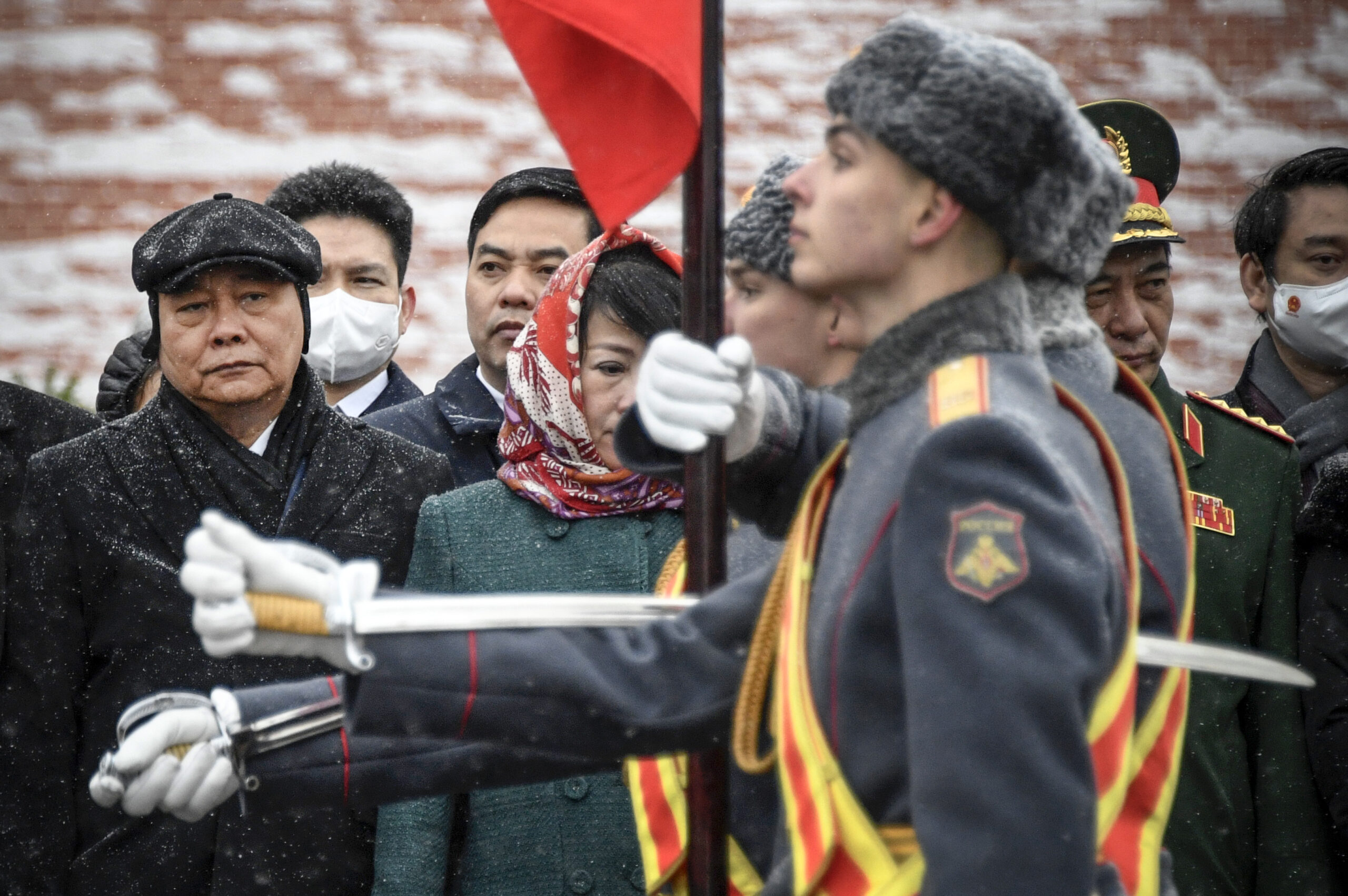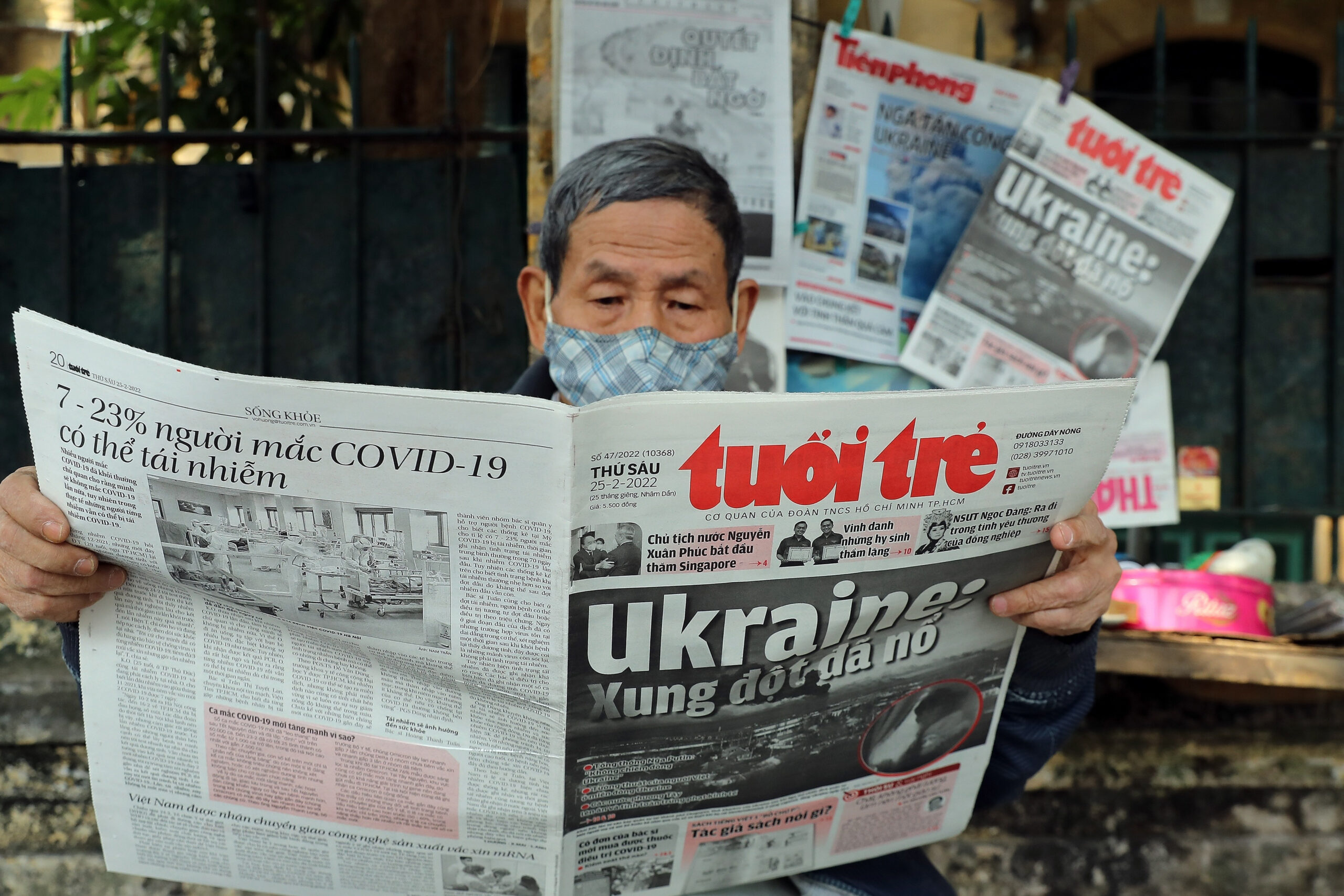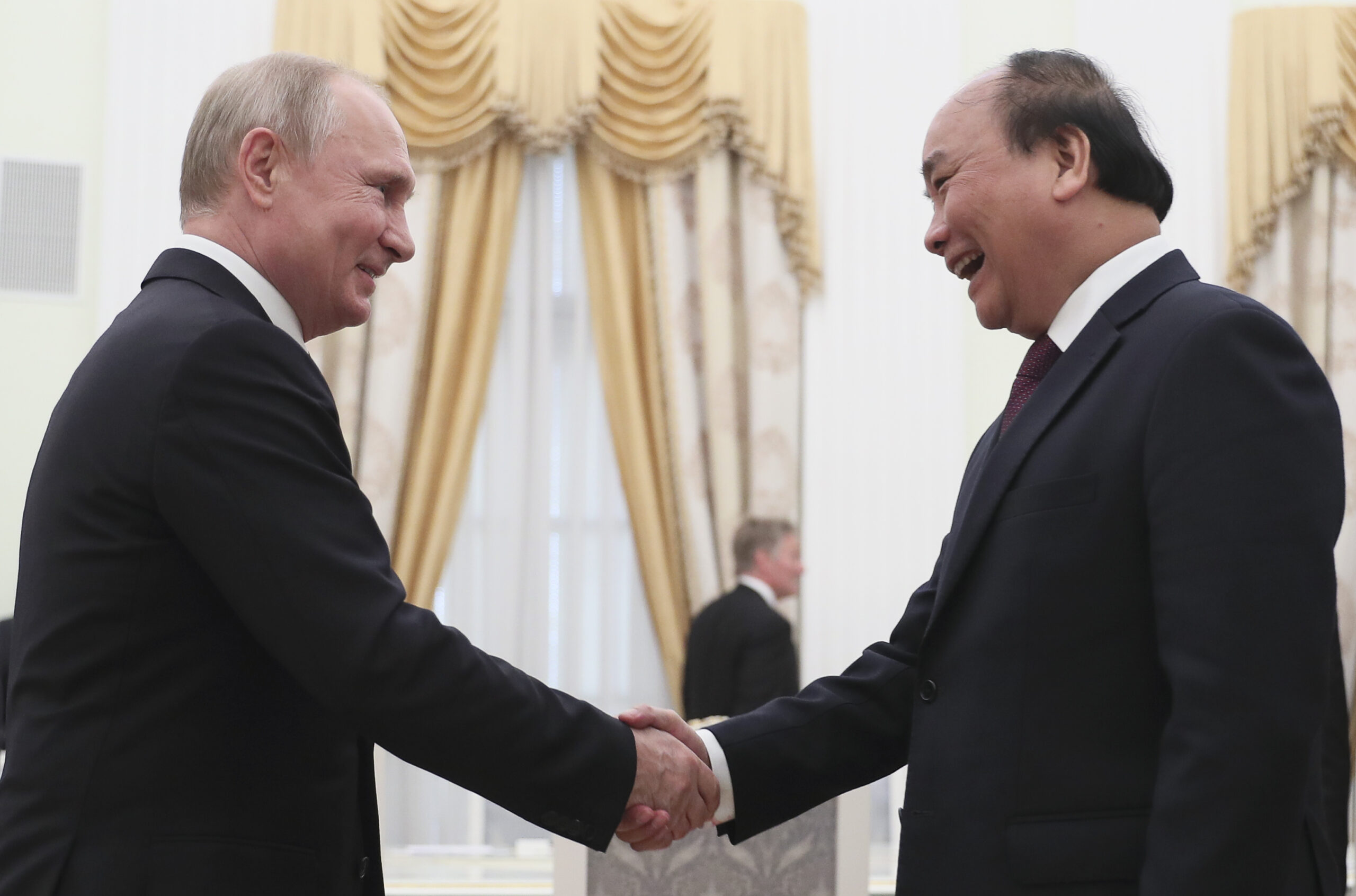Trinh Huu Long woke up on 24 February angry to see the news of Russia’s invasion of Ukraine. He was angered not only by Putin’s aggression but worried over what this war will mean for Vietnam.
“This could be a start of something worse, not only for Europe but for Asia,” said Long, the Taiwan-based co-director of Legal Initiatives for Vietnam, a nonprofit promoting democracy.
“This has everything to do with Vietnam as a small country living next to a giant power,” Long said of Vietnam’s 1,297-kilometre (806-mile) border with China. “We are very vulnerable. We need to rely on a rules-based international order.”
But Vietnam has a distinct allyship with Russia and has not issued an outright condemnation of the invasion. The Soviet Union backed northern Vietnam during its decades-long war with the U.S. and the aid continued after 1975.
Now, Russia has inherited these ties and Vietnam is its closest ally in the region. Vietnam buys the majority of its weapons from Russia and has given Russia its highest diplomatic status. Vietnam’s careful manoeuvring around Russia’s invasion is likely based on a shared history that has tightly bonded the two countries through today.
Nguyen Khac Giang, a Ph.D. candidate at the Victoria University of Wellington focusing on Vietnam and Asian affairs, noted Vietnam and Russia share a “unique and intimate relationship.”
The Soviet Union was one of the first countries to recognise Vietnam as a sovereign nation after it declared independence from France in 1945. During the ‘American War,’ as it is known in Vietnam, the Soviet Union supported communist forces. The Soviets provided North Vietnam with funding, equipment and advisors to assist their fight against encroaching global ‘imperialism,’ most visibly represented by the United States during the Second Indochina War, which stretched across Vietnam, Laos and Cambodia between 1955 and 1975.
In 1979, the Soviet Union sent arms, military equipment and advisors to the Vietnam-China border during an invasion by Chinese forces. That support likely deterred a much larger-scale invasion, Giang said.
“Russia inherited the position from the Soviet Union so all the love, all the gratitude, the friendship and the brotherhood that the Vietnamese have for the Soviet Union, they naturally [kept] this kind of sentiment toward Russia,” he said.
This affection is reflected in the Vietnamese government granting Russia its highest diplomatic status level, a “comprehensive strategic partnership,” said Giang, who recalled a 2017 survey that found Putin enjoyed an 89% approval rating in Vietnam at the time, higher than in Russia.
“Since Vladimir Putin came into power in 2000 there has been a sense in Vietnam, like quite a popular sentiment in Vietnam, that Putin actually has brought back the greatness of the Soviet Union,” he said.

The United Nations General Assembly gathered in New York City on 2 March to vote on a resolution condemning Moscow for invading Ukraine and demanding withdrawal of military forces. The room erupted in applause when two large screens showed the majority of nations voted for the resolution.
While 141 countries voted in favour and five countries opposed the resolution, Vietnam was one of 35 nations to abstain from voting.
In an address to the UN before the resolution vote, Vietnam’s Permanent UN Representative Dang Hoang Giang called for a resumption of dialogue and negotiation “with a view to achieving long-term solutions that take into consideration the interests and concerns of all parties, in accordance with international law, in particular the respect for sovereignty and territorial integrity of states.”
Giang of Victoria University said the ambassador’s statement was “quite extraordinary because it implicitly criticises the invasion of Russia on Ukraine.”
The statement pointed to Vietnam’s own suffering from invasions and war and claimed that Ukraine’s interests should be respected in line with the UN charter’s national sovereignty doctrine, Giang said.
“In a way, it’s a veiled criticism against Russia and I think that probably is the farthest that Vietnam can go because of the special relationship that it has with Russia,” he added.
Ha Hoang Hop, a visiting senior fellow at the Institute of Southeast Asian Studies-Yusof Ishak Institute, a political and economic research centre in Singapore, said Dang Hoang Giang “skirted around the issue of Russia’s aggression” by abstaining from the UN resolution vote.
“Abstaining means indecision, and Vietnam will have to look more at Beijing’s actions in [the] South China Sea,” he said. “If a foreign country invades Vietnam, Vietnam will not expect the international community to abstain to any similar UN resolution against war and invasion.”
Long said his country’s UN action did not accurately reflect the will of citizens, noting that Dang Hoang Giang essentially “agreed that this was unlawful but they voted otherwise.”
“I think that the majority of Vietnamese people voted with the 141 countries that voted yes for the resolution,” Long said. “The Vietnamese government does not represent the Vietnamese people’s public opinion on this Ukraine issue. It is so clear that it is a grave violation of international law.”
Long said Vietnam’s citizens should expect more from their representation on the international stage: “This is irresponsible. We are on the wrong side of history on this issue.”
He added that a delegation of Vietnamese civil society organisations met with the Ukrainian ambassador at its embassy in Vietnam with a letter of support from more than 200 organisations and individuals.
“[The Vietnamese population] is divided but I believe that the majority is on Ukraine’s side, not Russia’s,” Long said.

Vietnam’s economy, energy sector, defence capabilities and the future of activism could all be impacted by Russia’s military campaign.
Long noted Vietnam’s media outlets are not allowed to use the word ‘invasion’ in reference to Russia’s actions in Ukraine and critical statements in local news sources are suppressed.
Most of the Vietnam army’s military equipment is purchased from Russia, which could be halted as a result of sanctions by Western nations, Giang said, although the country has been able to purchase military items from Israel and the U.S. since 2015.
A 2019 study by the Stockholm International Peace Research Institute found Vietnam imported 84% of its total arms from Russia between 1995 and 2019. The submarines, tanks, fighter jets and assorted weaponry totaled $7.4 billion during the time period.
Sanctions also could impact Vietnam with a disruption in remittances for Russian transactions, problems for Vietnamese nationals living in Russia and lost tourism revenue.
“Phan Thiet is called ‘Little Moscow,’ so when there are no Russians around it will be a big blow for local tourist operators,” Giang said.
Hop concurred that sanctions against Russia could hurt its Southeast Asia ally and business partner.
“Sanctions to Russia have been affecting Vietnam negatively from 2014. New Western sanctions will further impact Vietnam,” he said, adding that Russia’s supply of weapons and military equipment maintenance to Vietnam has provided conventional deterrence to an invasion.
Lucas Myers, a coordinator and Southeast Asia associate at the Wilson Center, a nonpartisan policy institute in Washington, D.C., said Vietnam is in “the most complicated position” resulting from its close defence relationship and energy sector involvement with Russia amidst growing diplomatic ties to the U.S.
“Vietnam is Russia’s closest partner in Southeast Asia, and Russian energy investments and arms sales make this situation complicated for Hanoi,” Myers said.

Russian arms sales to Vietnam could run afoul of U.S. legislation placing sanctions on perceived U.S. adversaries, including Russia, North Korea and Iran. The energy sector could also face future Western sanctions, Myers said, with targets including Zarubezhneft, a Russian state-controlled oil company drilling in the South China Sea.
“In the long-term, Vietnam could find itself under increasing pressure to purchase arms from Western partners and find alternative investors in its energy sector,” Myers said. “However, considering the large risks of attracting Chinese anger as a result of investments in the South China Sea energy market, it will be difficult to find partners with as much risk tolerance as Russian energy firms.”
Giang agreed that Vietnam’s response to the Ukraine invasion is influenced by its location within China’s regional sphere of influence, which he added is the case for most of the smaller nations of Southeast Asia.
This is not about choosing sides between Russia or Ukraine. You are choosing principles.”
Nguyen Khac Giang, Ph.D. candidate, Victoria University of Wellington
“Similar to Ukraine, Vietnam is a small country that stays next to a very powerful military power, that is China,” Giang said. “Vietnam is always very concerned about the aggression from China. And Vietnam probably believes that if they don’t speak out this time, and then maybe something happens in the future, no one will speak for Vietnam if something similar happened. It’s a matter of principle.”
He added that the Ukraine crisis means less attention will be paid in the near future to developments in Asia: “It will be a tough time ahead for countries in the region in terms of dealing with the rise of China.”
Long said Vietnam “cannot survive in a might-equals-right international order.”
“I just hope that a small country like Vietnam would be more supportive of a rules-based international order,” he said. “This is not about choosing sides between Russia or Ukraine. You are choosing principles.”
Vietnam isn’t the only Southeast Asian country looking to hedge Chinese influence through connections to Russia.
The Lao People’s Democratic Republic has good Chinese relations but also is “overwhelmingly economically dependent upon China.” Somewhat like Vietnam, Laos may possibly view Russia as “a hedge against dependence” on China, Myers said.
“Unlike Vietnam, however, Lao PDR does not have close relations with the United States and will likely have few alternate options to its defence ties to Russia,” he said. “Over the long-term, Lao PDR will likely continue to expand its ties to Russia.”
Zachary Abuza, a Southeast Asia expert at the National War College in Washington, D.C., said Vietnam, Laos and Myanmar will see an impact on their military supplies from Russia. Vietnam and Laos are in a “particular bind” after remaining long-time Russian clients.
“They abstained from the UN vote and both militaries are dependent on Russia for arms,” Abuza said, “but they really need to consider Putin’s justifications for war and the fact that the Chinese have endorsed Russia’s actions. Caveat emptor.”
Additional reporting by Brian P. D. Hannon.
This article was updated 17 March 2022 to explain the Soviet Union sent arms, military equipment and advisors to the Vietnam-China border in 1979.


